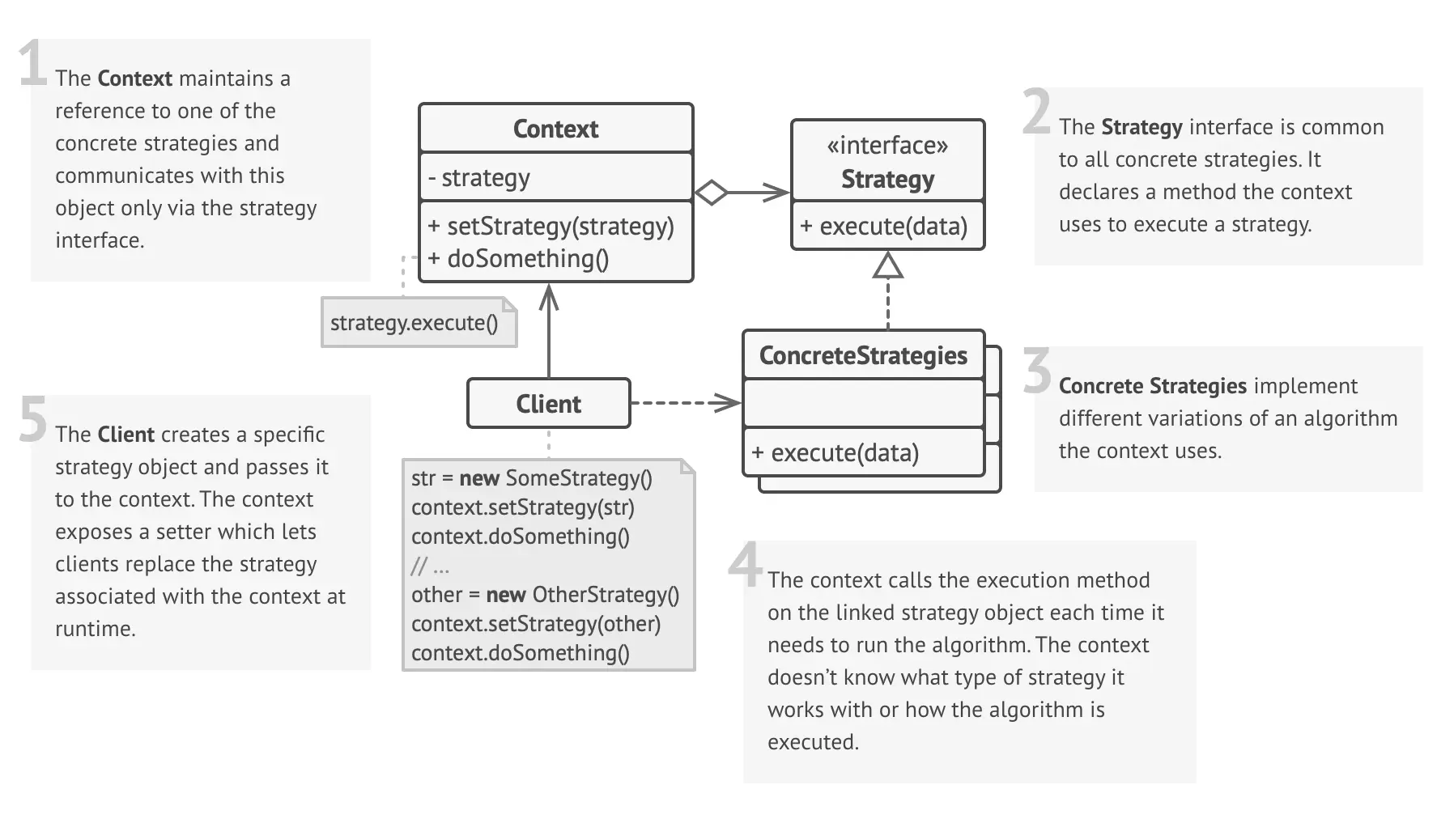Software Design - Strategy Pattern
Explore the Strategy Pattern, its structure, use cases, and benefits in software design.
Definition
Imagine you’re ordering a pizza 🍕 — you have different ways to pay:
- Cash 💵
- Credit Card 💳
- PayPal 🏦
Each method achieves the same result (payment) but works differently.
Similarly, the Strategy Pattern:
- Defines a family of algorithms.
- Encapsulates each algorithm.
- Makes them interchangeable.
- Allows algorithms to vary independently from clients that use them.
The Strategy Pattern is a behavioral design pattern that enables selecting an algorithm’s behavior at runtime. This pattern is useful when you have multiple ways to perform a task, and you want to choose the best one at runtime.
Structure
 Strategy Pattern Structure taken from Refactoring Guru
Strategy Pattern Structure taken from Refactoring Guru
Main Components:
- Context — Maintains a reference to a Strategy object.
- Strategy Interface — Common interface for all strategies.
- Concrete Strategies — Implement different variations of the algorithm.
Key Characteristics
Encapsulation of Behavior
➔ Each behavior (algorithm) is in its own class.
➔ Easy modification without affecting others.Interchangeability
➔ Strategies follow the same interface.
➔ Easy swapping at runtime.Decoupling
➔ Context doesn’t implement the algorithms directly.
➔ Reduces dependencies.Open/Closed Principle
➔ Open for extension, closed for modification.
➔ Add new strategies without altering existing code.
When to Use?
✅ Dynamic Algorithm Switching
- Ex: Google Maps switching between Shortest, Fastest, Scenic routes.
✅ Separation of Business Logic
- Ex: WinRAR supporting multiple compression formats (ZIP, RAR, GZIP).
✅ Reduced Class Duplication
- Ex: Amazon Payment Gateway handling multiple payment methods.
✅ Removing Complex Conditional Statements
- Ex: Loan interest calculations based on loan type.
When NOT to Use?
❌ Behavior Variations Are Rare
- If only 2–3 strategies exist, might be overkill.
❌ Performance Overhead Concerns
- Introduces additional objects and dynamic method calls.
❌ Client Should Not Manage Strategy
- If client shouldn’t handle strategy selection.
❌ Behavior Tightly Coupled with Context
- Encapsulating strategy may break encapsulation.
❌ Concrete Strategies Share Too Much Code
- Might lead to duplication instead of reuse.
Code Example
1
2
3
4
5
6
7
8
9
10
11
12
13
14
15
16
17
18
19
20
21
22
23
24
25
26
27
28
29
30
31
from abc import ABC, abstractmethod
# Strategy Interface
class PaymentStrategy(ABC):
@abstractmethod
def pay(self, amount):
pass
# Concrete Strategies
class CreditCardPayment(PaymentStrategy):
def pay(self, amount):
print(f"Paid ${amount} using Credit Card.")
class PayPalPayment(PaymentStrategy):
def pay(self, amount):
print(f"Paid ${amount} using PayPal.")
# Context
class ShoppingCart:
def __init__(self, payment_strategy: PaymentStrategy):
self.payment_strategy = payment_strategy
def checkout(self, amount):
self.payment_strategy.pay(amount)
# Usage
cart1 = ShoppingCart(CreditCardPayment())
cart1.checkout(100)
cart2 = ShoppingCart(PayPalPayment())
cart2.checkout(200)
Real-World Examples
- Payment Methods in E-commerce
- Interface:
PaymentStrategy - Strategies:
CreditCardPayment,PayPalPayment - Context:
ShoppingCart
- Interface:
- Route Calculation in Maps
- Interface:
RouteStrategy - Strategies:
CarRoute,BikeRoute,WalkingRoute - Context:
NavigationSystem
- Interface:
- Email Sorting in Gmail
- Interface:
EmailSortingStrategy - Strategies:
PrimaryInbox,PromotionsInbox,SpamFilter - Context:
EmailClient
- Interface:
- Image Filters in Instagram/Photoshop
- Interface:
ImageFilter - Strategies:
BlackAndWhiteFilter,SepiaFilter,BlurFilter - Context:
PhotoEditor
- Interface:
- Video Playback Quality (YouTube/Netflix)
- Interface:
VideoQualityStrategy - Strategies:
AutoQuality,HDQuality,UltraHDQuality - Context:
VideoPlayer
- Interface:
- Difficulty Modes in Games
- Interface:
DifficultyStrategy - Strategies:
EasyMode,NormalMode,HardMode,ExpertMode - Context:
GameEngine
- Interface:
- Text-to-Speech Engines
- Interface:
VoiceStrategy - Strategies:
MaleVoice,FemaleVoice,AIEnhancedVoice - Context:
TextToSpeechEngine
- Interface:
- Auto Text Formatting in Word Processors
- Interface:
TextFormatStrategy - Strategies:
BoldFormat,ItalicFormat,UnderlineFormat - Context:
WordProcessor
- Interface: